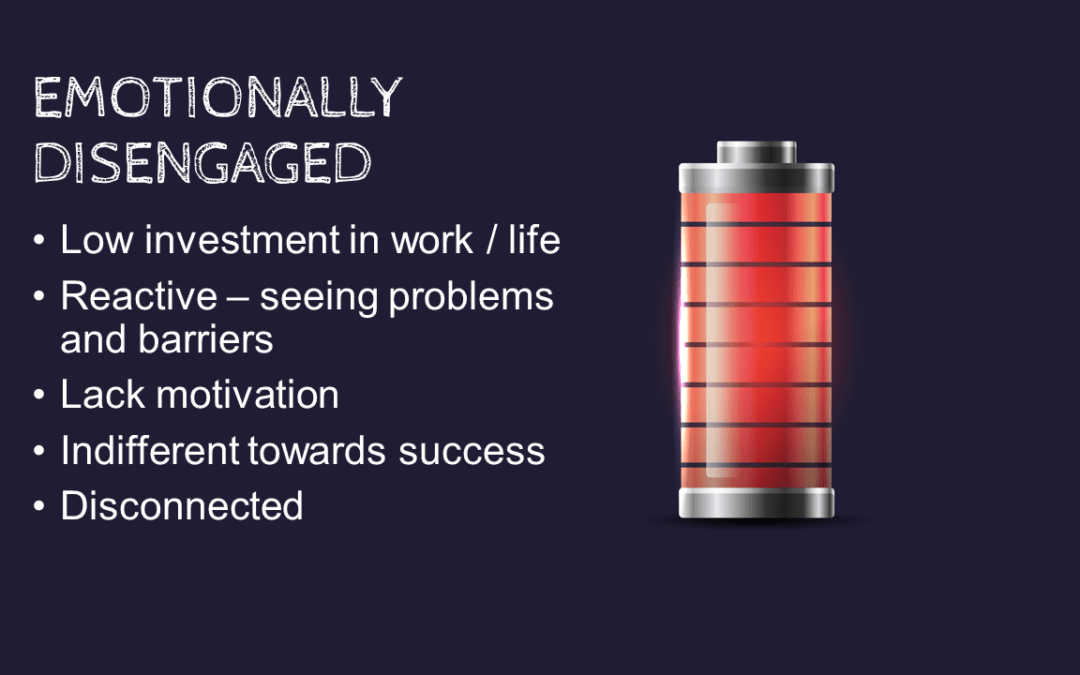Why emotional expression is good for us
Before my experience of depression, I wasn’t one for crying. I don’t like to cry and learned a pattern of not crying. However through my learning and understanding of mental health, I realised its value in helping let emotions go. I finally understood what it really meant to be strong. Crying was a part of it, for the more difficult emotions we have. For positive emotions, hugging people is part of it too. Asking for help is part of being strong, not weakness at all.
At my darkest moment, I was ‘emotionally disengaged’ – with everybody, everything. Usually, I like to connect with anybody and everybody, confident in my social skills. My poor mental health had made me a person I didn’t recognise, which further fuelled the confusion. As I started to feel better, I would describe myself as ‘emotionally engaged’ – a state of being better with emotional impact, but with room for improvement. But now, I’m much better – I am living in an ‘emotionally empowered’ state. What does this all mean?
A healthy mindset
Some talks you may have watched, or theories you have read about, talk about being ‘full’ of emotions as healthy mindspace. You will be familiar with sayings like having ‘a glass half full’ and and your ‘cup overflows’. But when it comes to emotions, it’s almost like this works in the complete opposite way. Without an outlet for these stored emotions, the likes of depression and anxiety creep in. If, for example, my year has been a challenging time, I might have experienced a wave of different emotions along with those challenges. All it might take is one more emotion to upset the balance in my mind – the fullness isn’t a healthy place to experience.
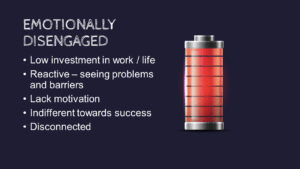
Three states of emotional health
I prefer to think of the three states of emotions like a battery. Instead of having control over when my emotions are released, they overflow uncontrollably. My battery is overcharged, and isn’t working productively. They may be expressed as outbursts, arguments, tantrums or emotionally fuelled actions – a volcano of release. I may fall into a pattern of critical or sniping comments and behaviours, unusual reactions that I wouldn’t normally use in a lowered emotional state. Each of these behaviours – the sniping moments and the volcano moments – offer a brief release of powerful, pent up emotions that I have been carrying around. When my battery is overcharged, it can’t supply energy as it should and disrupts my system. It’s obvious to see, therefore, where collecting emotions and not seeking a healthy release can be damaging to our wellbeing over time.
When you have reached the capacity of your emotional stores, and you are not expressing these collected emotions in a healthy way, we’re stuck in the ‘emotionally disengaged’ state. We lack interest in our own life, our energy and motivation is zapped. We function on a bare minimum, because of the energy we are using to keep these emotions back. When we are in this state, it’s harder to connect with even our friends and family, we’re indifferent about life decisions and may begin to neglect our basic health care needs – hygiene, routines, eating well, and exercise. These needs take a back seat to our main concern, which is trying to control emotions in a vessel that is close to overflowing. Looking back, this is how I remember my experience of living with depression.
If you recognize yourself as being in this state, you don’t have to accept it and just get on with your life. Recognising that you feel this way is actually the start of a new journey. You are beginning to understand your mental health. Understanding is the best tool you’ve got to fix this problem, and awareness takes you onto the next stage. Emotional Engagement – when we’ve begun to realise we’re carrying unwanted emotions around, we may begin to seek ways to offload some of those emotions. We may talk to a friend or therapist, or look at ways we can self care. The ‘volcano’ and ‘sniping’ moments are becoming fewer, as these new measures hlp us free up some more space in our emotional vessel.
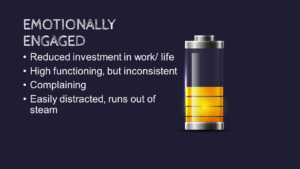
Why we get stuck in a cycle
As I explain this to clients, a lot of them say to me this is the stage they want to be at. It’s certainly a better position to be in, and feels a more controlled state. Day to day, you function a little better too – some healthy patterns are creeping their way back into your lifestyle. Your relationships improve, as the need for criticism and outbursts ease up. You have identified a problem, and are looking for solutions. There may be doubts about advice you received – will this help me? Will I be strong enough to make a change? Insecurities are still there bubbling under the surface, and the strong will of your stored emotions may pull you back, stopping you from taking action. Without further investment in learning about how you work the way that you do, progress is stalled. Feeling frustrated with your lack of progress, you may be prone to constant complaining or apathy. You add new emotions to your vessel – frustration and impatience – filling up your vessel a little more. So you try another safe outlet, or find a distraction. These could be something as everyday as social media scrolling, binge watching tv, or overeating. A new pattern emerges, and you again recognise the need to express these new collected emotions. So what’s next?
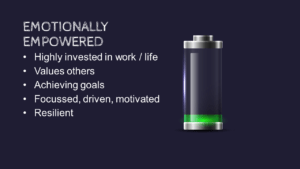
There is one stage in this journey – Emotional Empowerment. This is where the old problem of collecting emotions is almost eradicated. Here, you’re using your knowledge about yourself and how you can help yourself. You work to develop a healthy relationship with yourself, and enjoy healthier supportive relationships with others. By investing time and effort, you have learned new ways to safely express your emotions. When you are presented with daily challenges, as we all are, you feel assured that you can deal with them effectively. This is operating at the best that you can possibly be – highly invested in your own life, accepting challenges and setting new goals. You’re making better judgements and choices, feel motivated and inspired, and enjoying the experiences of living your life. You have reached an expert level in self awareness.
Empowered living
You will always know yourself better than anyone else – everywhere you go and have been, you have been there. You are the one constant in your life, and you are at the control desk pushing the buttons that make things happen in your life too. You can help yourself to feel happier – I know that’s not going to be all of the time, but in this state you experience happiness the most often. You become resilient, able to bounce back up when things knock you down.
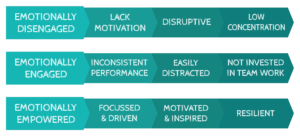
Each of these stages are experienced through gradual change. You can’t move from being disengaged to empowering yourself overnight. This is where coaching fits in – it offers you the opportunity to be held accountable for changes which will positively impact mental health, and your lifestyle. My coaching programme, EmotionMind Dynamic, focuses on forward movement of these three emotional states. Support offered by coaching sessions help you to explore these emotions that you have felt, and guide you to release them in a healthy, more effective way. Coaching tracks your progress too, which keeps your motivation levels up and encourages you to seek deeper understanding about your mental and emotional triggers and reactions.
Since refining this bespoke programme – which blends teaching, mindfulness and coaching practices – many of my clients have reached a state of empowerment. They feel in control of their lives once more, are moving forward and enjoying their lives. If you would like to know more about what coaching can offer you, or have any questions about the units of the programme, I would love to hear from you.

